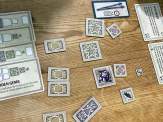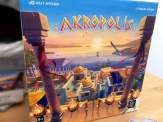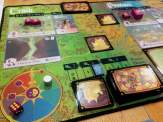| Release Date: 2025 | Players: 2-4 |
| Designer: Mark K. Swanson | Length: 45-90 minutes |
| Artist: Klemens Franz | Age: 12+ |
| Publisher: Odd Bird Games | Complexity: 3.0 / 5 |
| Plastic (by weight): 10% | Air (by volume): 65% |
There was no way out. The cell door was locked, the corridor quiet, and the warders had already done their rounds. A smuggled spoon pressed cold against the palm of my hand, a comb tucked into a loose floorboard, a stamp in my sock and a muffin hidden in the mess. None of it made sense yet, but I would figure it out. I had to. I was going to escape Spike Island, and when I did, my captors would shout: “He Fled!” by Mark K. Swanson from Odd Bird Games with art by Klemens Franz.
Listen to the Audio Version
Intro Music: Bomber (Sting) by Riot (https://www.
Sound Effects: bbc.co.uk – © copyright 2025 BBC
Music: Cicle Vascule by Blue Dot Sessions
The Escaped Past
According to its rulebook, Fled is set in 19th-century Ireland, when the famine pushed people to commit petty theft to allow them to survive. Yet, the British authorities of the time didn’t take these crimes lightly. They didn’t care if people were starving and needed to steal food and other essentials. No. They swiftly sentenced offenders to imprisonment. Many people ended up on Spike Island, a 103-acre island in Cork Harbour, which was nicknamed Ireland’s Alcatraz and at one time housed thousands of prisoners, including political detainees during the Irish War of Independence as well as thieves.
So Fled is set against a rather serious historical backdrop. Yet, the rulebook approaches the past from a much lighter angle. The rulebook’s introduction explains that you have been incarcerated for stealing a neckerchief for your sweetheart, and all you want in life now is to flee and return to the arms of your girl.
That’s really unfortunate, because the game could have represented the past more seriously and sensitively, rather than making light of it in the rulebook’s introduction. I know. Some of you will say that Fled is supposed to be an entertaining game, not a history lesson. I partly agree with that, but I don’t see any harm in the rulebook introducing the history in a more serious way. Let players learn about what happened in the 19th century. You can still play and enjoy the game afterwards.
Anyway. Moving swiftly on.
Prison Maze
In Fled, you lay tiles to construct the map of the prison while trying to stockpile contraband and tools, which will hopefully allow you to escape before your fellow inmates. That creates a thematic mismatch in my view. You’re not just a prisoner, constrained by the rules of the prison. No, you are also the architect and can decide how the prison is laid out and thereby influence your chances of escape. That feels weird and contradictory.
I suppose, Fled doesn’t actually make it that easy to create an easily escapable prison. There are various tile-placement restrictions, some of which make the game overly complex and which sometimes lead you to not being able to place any tiles.
After laying a tile, you play the remaining tiles to take actions. Ultimately, your goal is to collect contraband and tools to allow you to move through the prison, bribe warders and eventually escape. Yet, Fled makes this also very hard. You rarely have the right tiles to do what you need. You might be able to take one or two steps towards your goal this turn, but by the time the round comes back to you, the situation will probably have changed and you have to rethink everything.
Fled feels like a game of exhausting specificity. Everything matters. Rooms, icons, distances and turn order. To move, you must have the right symbol. Gaining points requires that you are in the correct room and have a matching tile. To exchange items for more valuable ones, you must be in a warden’s office or share a space with the chaplain. Escaping requires the tiles to line up, your inventory to be correct, and the path to be clear.
It’s not just hard to escape Spike Island. It’s impossible and futile.
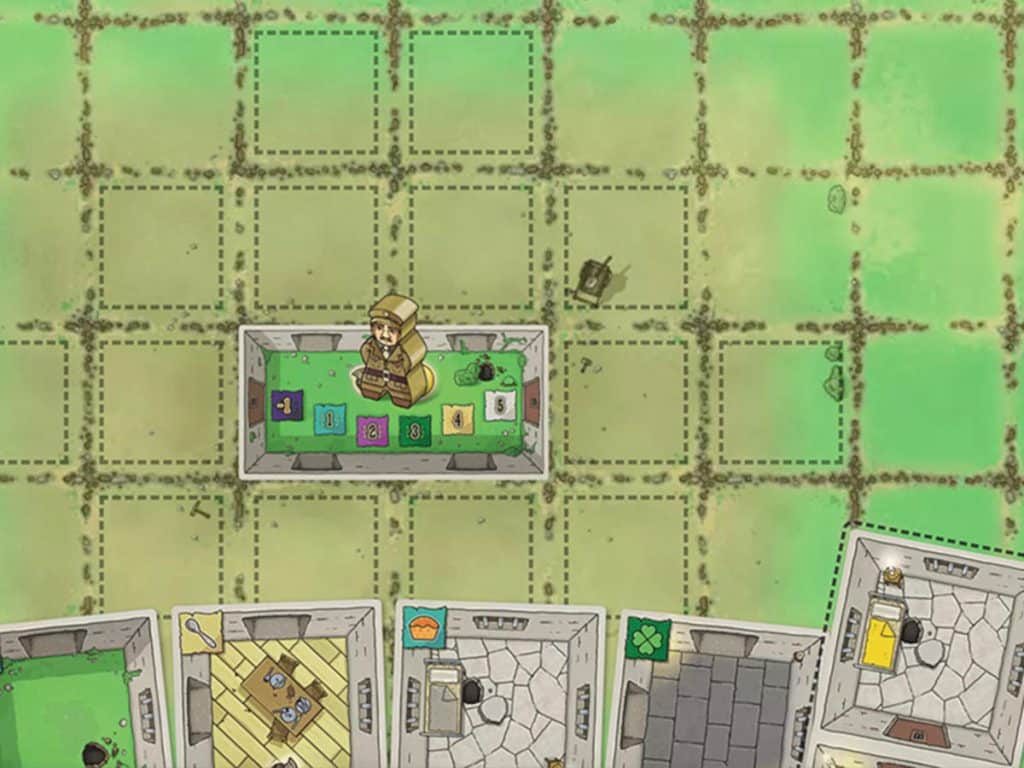
Prison Inmates
Now, Fled is a competitive game, and player interaction does exist. You can move the warders by playing a whistle tile, which allows one player to place a penalty tile on another, reducing their score and blocking their actions until it is removed. If a prisoner is caught again, they are sent back to their cell or into solitary confinement, losing a full turn.
Although this threat sounds dramatic, it rarely has a significant impact. It is difficult to obtain the right tiles to position a warder effectively and too much changes between turns. When it does succeed, it tends to feel more like a nuisance than a significant setback.
Another element that unnecessarily complicates Fled is the rulebook. Even after a careful read-through, setting up a dummy game, and taking a few test turns, the process of teaching the game often adds more confusion than clarity. The explanation takes too long, yet full understanding is needed before players can begin.
Fled comes with player aids which are beautifully illustrated and form a triptych alongside other tiles, but the icons are too small and the are just too many of them.
The tiles themselves can also feel overly busy. While I love the artwork by Klemens Franz, it occasionally makes the tiles harder to read. Also, passages between tiles, such as archways, doors, or barred windows, are too small and not always easy to see, especially on tiles further away. As the prison map expands during the game, tiles will end up quite a way away from players, which creates a similar issue to that in Carcassonne, where players must rely on others to help identify what tiles look like and if they can play their own tiles there.
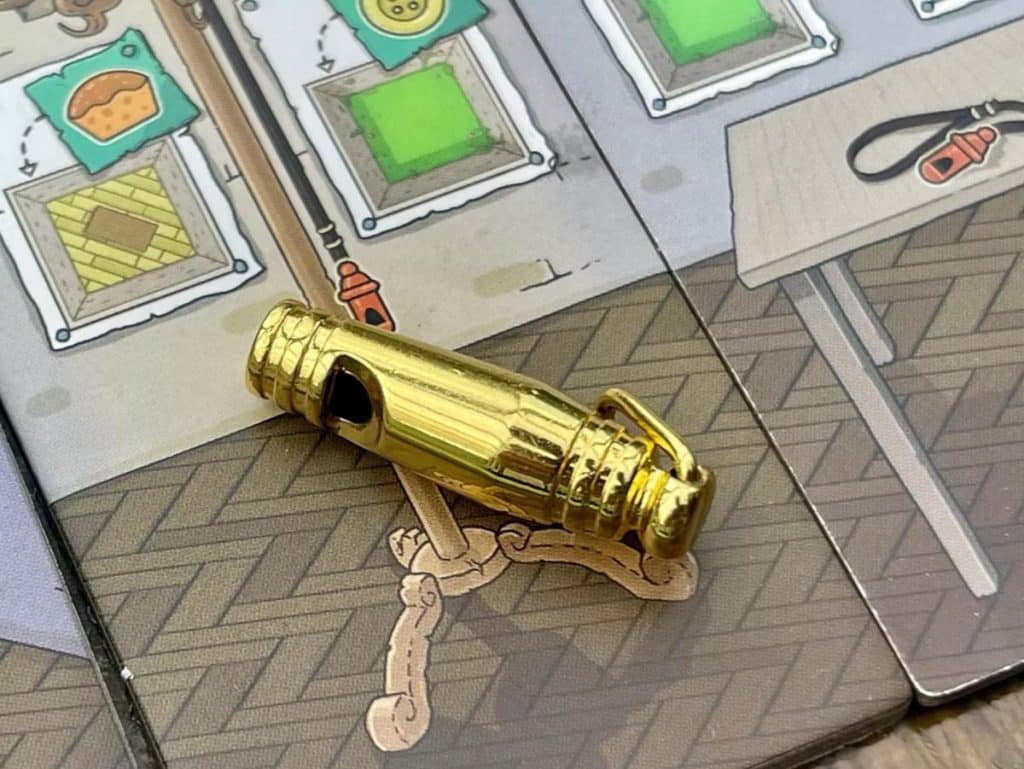
I Fled!
I really wanted to love Fled. Tile-laying games are one of my favourite board game genres. I was excited by the theme and its historical setting. However, even ignoring how little attention the game pays to the past, Fled is just more complex than it needs to be. Turn after turn is spent planning around restrictions, and in the end, you have to rethink everything because the game state changes so much. It’s frustrating. Players don’t have any influence on the game. I suppose, for a game that mimics the suffocating atmosphere of a 19th-century prison, it evokes all the right emotions.
Unfortunately, futility is another emotion it evokes. Due to the restrictions and the tile drawing luck, it is easily possible to completely scupper your escape in your first few turns. While that doesn’t necessarily mean that you’ve lost the game, because you can still win without escaping, you will probably be in no position to score any meaningful amounts of points either.
Maybe Fled is a game that you need to play a lot more to enjoy. Unfortunately, it just takes too many plays to get there, by which time you’ve given up and accepted your lot.
As I say, maybe that’s Fled‘s intention. Maybe it’s trying to show the futility of a prison escape. The game might intentionally make it so hard to show players that they’re better off sticking to the rule of law. Yet, there is nothing in the rulebook that indicates that’s what the game tries to achieve. On the contrary, Fled seems to sell itself as a fun game of breaking out of jail.
So, yes, it just didn’t work for me and the people I played it with, but maybe you will have a much better experience when you play Fled.
Keeping the blog running takes time and resources. So if you can chip in, that would be amazing.
Useful Links
- Fled: https://oddbirdgames.
com/ escape-from-a-vile-victorian-prison/ - Rulebook: https://boardgamegeek.
com/ filepage/ 275195/ official-fled-english-rulebook-compressed-v3 - Odd Bird Games: https://oddbirdgames.
com/ - BGG listing: https://boardgamegeek.
com/ boardgame/ 382444/ fled
Videos
Transparency Facts
I feel that this review reflects my own, independent and honest opinion, but the facts below allow you to decide whether you think that I was influenced in any way. Please also read my Ethics Statement for more information.- I was given a free review copy of this game by the publisher.
- At the time of writing, I have not received financial support from the publisher or anyone working on their behalf.
Audio Version
Intro Music: Bomber (Sting) by Riot (https://www.
Sound Effects: bbc.co.uk – © copyright 2025 BBC
Music: Cicle Vascule by Blue Dot Sessions
Playlist
These are the songs I listened to while I was writing this review:



